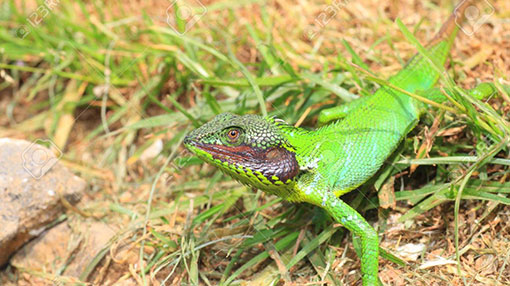Sri Lanka calls for increased protection for endemic lizards
April 19, 2019 12:37 pm
Sri Lanka will push for international protection of its endemic lizards threatened by smuggling when it hosts a global biodiversity trade summit next month.
When the 18th meeting of the Conference of Parties (CoP18) of the Convention on International Trade in Endangered Species of Wild Fauna and Flora (CITES) convenes in Colombo from May 23, the host nation will be seeking to get several lizard species included in Appendix I, which lists species threatened with extinction.
Leading herpetologist and author Anslem de Silva told Mongabay that despite strong legal protection, there had been several recent attempts to smuggle endemic lizards out of the island.
“It would be important to enhance protection for species other than the most exotic or best-known,” he said. “The value of those proposed for inclusion in Appendix I is tremendous.” He added there needed to be strict enforcement of the island’s conservation laws to prevent smuggling of species.
De Silva who has worked on amphibian and reptile conservation for decades, said the Knuckles Mountain Range and the Sinharaja Forest Reserve, both in central Sri Lanka, formed two very important ecosystems, specially for lizards.
Samantha Gunasekera, director of the Colombo-based CoP18 Secretariat, said a push for protection would be timely. “It is a good move to list some of the endemic lizard species in Appendix 1. Sri Lanka is a biodiversity hotspot and there is a need to introduce multiple layers of protection for the species,” he told Mongabay.
A former head of the biodiversity unit of the island’s department of customs, Gunasekera said Sri Lanka enjoyed a solid reputation for species conservation and for avoiding questionable biodiversity trade. Likewise, it was important to ensure global protection to prevent species from being smuggled out.
Among those proposed for inclusion in Appendix I is the black-lipped lizard (Calotes nigrilabris), an agamid species found only in Sri Lanka.
Also proposed is another agamid lizard endemic to the island, Pethiyagoda’s crestless lizard (Calotes pethiyagodai), which is restricted to the Knuckles Mountain Range, considered a unique biodiversity location that’s home to many endemic reptiles.
Another native on the proposed list is the Knuckles pygmy lizard (Cophotis dumbara), classified by the International Union for Conservation of Nature (IUCN) as critically endangered due to rapid habitat loss and logging.
The pygmy lizard (Cophotis ceylanica) is another endemic agamid included in the proposals, along with lizards under the genus Ceratophora, whose males sport a horn on the snout.
Sri Lanka has also submitted a joint proposal with the United States to protect tiger spiders, a genus of tarantula native to Sri Lanka and India.
While supporting the proposal to include select lizard species in Appendix I, Gunasekera said it was equally important to call for the complete implementation of domestic conservation laws. “We need full implementation of national regulations, in keeping with commitments made under the CITES convention — and this extra layer of protection by having specific species listed in the Appendix I,” he said.
CoP18 will be the final CITES CoP meeting prior to the Beijing summit in 2020 under the Convention on Biological Diversity (CBD), which is expected to come up with a new global biodiversity framework.
The decision to list any species under CITES is contentious, and among the most regularly debated is the move to conserve elephants through restrictions on ivory trading — a major source of income for several African countries that continue to lobby for more relaxed regulations on the trade.
CITES has since 1975 regulated the international trade in some 36,000 species of plants and animals, including their products and derivatives. The CITES permit system supports sustainable, legal and traceable trade of listed species.
The CITES meetings are generally held every three years when trade rules relating to flora and fauna are reviewed and amendments are proposed for future conservation.
The summit in Colombo is expected to bring in around 4,000 delegates from 183 countries to discuss international biodiversity trade policies, propose amendments, review action plans and address implementation concerns, according to John Amaratunge, Sri Lanka’s minister of tourism and wildlife conservation.
“CITES provides a good opportunity to draw global attention to our unique biodiversity, a key driver of Sri Lanka’s tourism sector. Our national parks and nature reserves are huge revenue spinners. Famed for elephants, leopards, birds and reptiles, there is renewed interest in Sri Lanka’s wildlife, after the war ended. Now there’s complete access and we hope visitors can enjoy our unique biodiversity –without causing harm,” Amaratunga said.
Source: Mongabay
-Agencies














